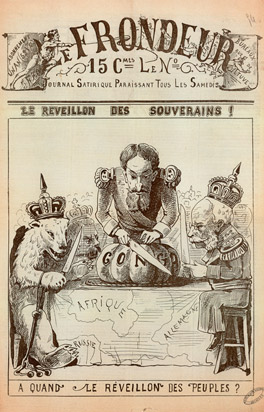THE CONGOLESE 'CAKE'
 'Le réveillon des souverains ! à quand le réveillon des peuples ?' 'Le réveillon des souverains ! à quand le réveillon des peuples ?'Le Frondeur, 20/12/1884Coll. Royal Library of Belgium |
Since 1884, when the Berlin Conference granted Leopold II control of the country, the great powers have vied for Congo's immense natural resources. In 1960, Belgium grants political independence but retains control of the Congolese economy. A few years later, Mobutu takes power, supported by Western powers. Mobutu's death generates a wave of hope and freedom that soon recedes with the country's implosion and the resumption of war. After the sweeping transformations on the international scene in the late 1980s, Zaire enters a long period of transition. At the end of the 1990s, following the Rwandan genocide, a regional conflict erupts in the east that leads to two wars involving six African countries vying for Congo's natural resources: Angola, Burundi, Uganda, Rwanda, Tanzania and Zimbabwe. While affecting the entire country, the war is at its most intense in the eastern provinces and the equatorial forest, two regions long coveted for their natural resources. The two wars are among the bloodiest on record: millions dead and countless sex crimes, particularly the rape of women. Rebel groups are armed by multinational companies and Congolese criminal networks. The international community, for the most part, stays out of it. Experts expose repeatedly the link between plunder, unfair exploitation of Congo's natural resources, and systematic violations of human rights. Throughout these successive crises and wars, the Congolese people remain strong, clinging fiercely to the notion of a united country and resisting 'Balkanization', even though the state fails to maintain control of the national territory. |


